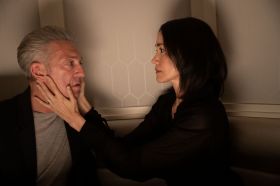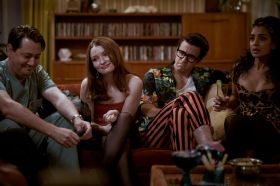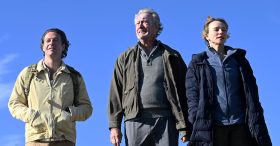What happens when we look at the AACTA awards in terms of their box office success? Cruel I know, but the industry runs on money.
The film results for AACTA 2022 were brutal. Elvis took the best film, best director, best actor, best supporting actress, along with cinematography, costume design, editing, production design, sound, hair and makeup, casting, VFX or animation, AND the audience choice award.
Read: Elvis, Heartbreak High, and Mystery Road blitz 2022 AACTA Awards
So 14 of the 18 awards went to the one film. Catherine Martin also received the Longford Lyell Award for her work as a producer, costume designer and production designer at the core of Bazmark, the production company she formed with Baz Luhrmann in 1997. She can put that trophy with her four Oscars.
Elvis made $33.47m in Australia, $222m in the US and $422m around the world. [All figures in AU$]. The budget is probably around $125m which means that Warners went into profit and Bazmark’s reputation is burnished further – along with his determination to make the film here with a lot of local talent.
But the resources offered to Elvis are massively larger than any other nominee, except for Three Thousand Years of Longing from George Miller, which cost around $90m to make and took $28m around the world, including all of $1.36m in Australia. Of the two big Australian films this year, one took off like the proverbial rocket and the other died in a ditch. There is no such animal as a sure thing in movies.
Neither of these films had an Australian feel and audiences did not care. The figures reflected the international response.
The figures for the other nominees
Let’s look at the other nominated films in those key best film and best director categories.
The Drover’s Wife: The Legend of Molly Johnson, from Leah Purcell and the Bunya Productions team, won best lead actress for Purcell, took $1.91m at the box office, and scored the the Jury Grand Prix at the Asia-Pacific Screen Awards, the Best Film at Sydney Film Festival, Best International Film at Warsaw, and screenings at Cinefest Oz and the Melbourne and Brisbane festivals. So it can claim solid festival clout, and a continuing path to reach audiences. The cinema box office is good compared to many other excellent overseas films, but could be much better.
It can be found on Prime, Foxtel Now, Google Play, Apple TV and Ritz at Home.
Here Out West is a Sydney compendium film combining new writers with excellent women directors which is a fantastic initiative full-stop. It made $61,000 in cinemas but it is on ABC iView at the moment, reflecting the cultural importance of the project.
The Stranger won best supporting actor for Sean Harris; I wonder where Joel Edgerton stood in the battle for best actor against the formidable lineup with Austin Butler, Rob Collins, Idris Elba and Damon Herriman. Most interesting here is the screenplay award, which went to The Stranger’s writer-director Thomas M Wright, who beat the teams around Elvis and Three Thousand Years of Longing, and the solo efforts of Leah Purcell for Molly Johnson and Jackie van Beek for Nude Tuesday.
The Stranger has serious festival cachet from Cannes, where it ran in the official Un Certain Regard strand celebrating newish directors throbbing with art and daring. It also ran in the Melbourne International Film Festival Bright Horizons strand, and screened in official competition at Brussels.
The Stranger is available now on Netflix internationally, backed by 95% on the critic list on the Tomatometer, reflecting a lot of impressed reviews with phrases like ‘finely tuned unconventional crime drama … skilfully minimalist … increasingly tense, immersive atmosphere … revitalises the undercover cop genre … slow-burn death stare into the heart of the abyss …’
Again, this was an astute film to support – it is buildling the career of an important director, pushes the arthouse clout of its lead actors, is available to local audiences and can be seen around the world.
Written in English but translated into Zǿbftąņlik, Nude Tuesday was nominated for three actor awards, but did not score a win. It is a New Zealand (and Australian) new-age satire directed by Armağan Ballantyne and produced by Nick Batzias, Emma Slade and Virginia Whitwell. It made $87,000 in early July, though it has fun written all over it. It is now streaming on Stan.
It should be celebrated for its sense of fun (which we always need to siphon from New Zealanders), it builds the association between the two countries, and pushes Good Thing Productions run by Virginia Whitwell and Nick Batsias.
Cezary Skubiszewski won the Best Original Score for Falling for Figaro. He already has four AFI and AACTA awards, along with six Australasian Performing Rights Association Awards, which composers covet. Falling for Figaro is an official UK-Au coproduction, with strong popular elements in Joanna Lumley and its opera theme, which made $1.063m here and $1.6m altogether.
The AACTA managers have tried to find a separate space for low budget films over several iterations, in the belief that they should be judged by separate criteria from the major films. They now have a separate category for films under $1m, which was won by A Stitch in Time, a gentle film set around dressmaking, written, directed and produced by Sasha Hadden, with Don McAlpine as cinematographer. It made $239,000 and may have repaid its investors.
It is not streaming at the moment – but it should.





